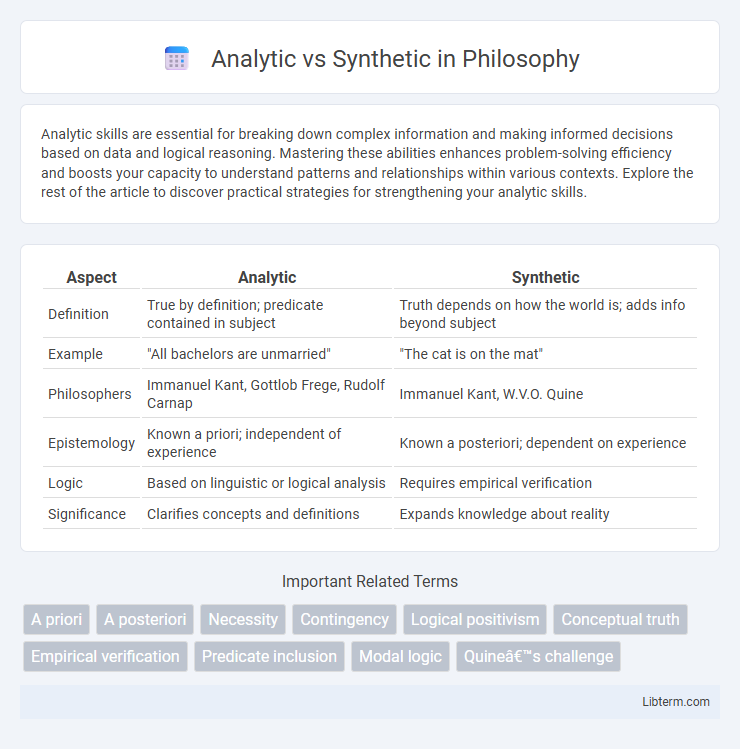Analytic skills are essential for breaking down complex information and making informed decisions based on data and logical reasoning. Mastering these abilities enhances problem-solving efficiency and boosts your capacity to understand patterns and relationships within various contexts. Explore the rest of the article to discover practical strategies for strengthening your analytic skills.
Table of Comparison
| Aspect | Analytic | Synthetic |
|---|---|---|
| Definition | True by definition; predicate contained in subject | Truth depends on how the world is; adds info beyond subject |
| Example | "All bachelors are unmarried" | "The cat is on the mat" |
| Philosophers | Immanuel Kant, Gottlob Frege, Rudolf Carnap | Immanuel Kant, W.V.O. Quine |
| Epistemology | Known a priori; independent of experience | Known a posteriori; dependent on experience |
| Logic | Based on linguistic or logical analysis | Requires empirical verification |
| Significance | Clarifies concepts and definitions | Expands knowledge about reality |
Introduction to Analytic vs Synthetic
Analytic statements are propositions true by definition, where the predicate concept is contained within the subject concept, such as "All bachelors are unmarried." Synthetic statements provide information that extends knowledge by connecting concepts not inherently linked, exemplified by "The cat is on the mat." Understanding the distinction between analytic and synthetic statements is fundamental in epistemology and philosophy of language, influencing theories of meaning and knowledge acquisition.
Defining Analytic Judgments
Analytic judgments are statements true by virtue of their meaning, where the predicate concept is contained within the subject concept, such as "All bachelors are unmarried." These judgments are necessarily true and do not require empirical verification, relying solely on logical analysis of language. Immanuel Kant emphasized that analytic judgments are informative about the relations of concepts but do not extend our knowledge beyond what is already implicit in definitions.
Understanding Synthetic Judgments
Synthetic judgments extend beyond the subject's concept by adding new information that is not contained within the predicate, thereby expanding knowledge. These judgments require empirical verification or additional insight, contrasting with analytic judgments that are true by definition. Understanding synthetic judgments is crucial for exploring how humans acquire new knowledge through experience and observation.
Historical Background: Kant’s Perspective
Immanuel Kant's philosophical framework distinguished analytic judgments, where the predicate is contained within the subject, from synthetic judgments, which add new information beyond the subject's concept. This differentiation emerged in his 1781 work, *Critique of Pure Reason*, as a means to address the limits of human knowledge and the conditions for possible experience. Kant emphasized synthetic a priori knowledge as foundational, proposing that certain truths extend understanding without relying solely on empirical verification.
Key Differences Between Analytic and Synthetic
Analytic statements are true by virtue of their meanings and logical form, making their truth dependent on definitions and language conventions, whereas synthetic statements require empirical verification as their truth depends on facts about the world. Analytic propositions are necessarily true and tautological, while synthetic propositions are contingent and informative, providing new knowledge beyond mere definitions. The key difference lies in the basis of their truth: analytic truths are a priori and self-evident, synthetic truths are a posteriori and based on experience.
Analytic vs Synthetic in Language and Logic
Analytic statements are true by definition, where the predicate is contained within the subject, exemplified by sentences like "All bachelors are unmarried." Synthetic statements depend on empirical verification, as their truth relies on external facts beyond language alone. In logic and language philosophy, the distinction clarifies how propositions are evaluated, influencing theories of meaning and knowledge acquisition.
Real-world Examples of Analytic and Synthetic Statements
Analytic statements, like "All bachelors are unmarried," are true by definition and do not rely on external evidence, exemplified by mathematical truths such as "2 + 2 = 4." Synthetic statements require empirical verification, such as "The Eiffel Tower is in Paris," which depends on real-world observation. In scientific contexts, hypotheses like "Water boils at 100degC at sea level" are synthetic because they must be tested through experimentation.
Philosophical Implications and Debates
The distinction between analytic and synthetic judgments fundamentally shapes epistemology and metaphysics by addressing how knowledge is derived and validated. Analytic statements, true by virtue of meaning and logical form, contrast with synthetic statements, which expand knowledge through empirical verification, fueling debates on the limits of a priori knowledge. Philosophers such as Immanuel Kant and W.V.O. Quine challenge the boundary between these categories, influencing contemporary discussions on language, meaning, and the structure of scientific theories.
Impact on Epistemology and Knowledge Theory
Analytic statements, true by virtue of meanings and independent of empirical evidence, shape epistemology by emphasizing logical certainty and definitions in knowledge acquisition. Synthetic statements, relying on empirical observation, influence knowledge theory by introducing contingent truths that expand understanding through experience and verification. The interplay between analytic and synthetic distinctions affects debates on a priori knowledge and the foundations of scientific inquiry.
Conclusion: The Relevance of the Distinction Today
The distinction between analytic and synthetic statements remains relevant in contemporary philosophy and linguistics by clarifying how meaning and knowledge interact. Analytic statements are true by definition and depend on linguistic conventions, while synthetic statements require empirical verification, anchoring knowledge in experience. This differentiation influences debates in epistemology, semantics, and artificial intelligence, shaping approaches to meaning, truth, and the acquisition of knowledge.
Analytic Infographic

 libterm.com
libterm.com